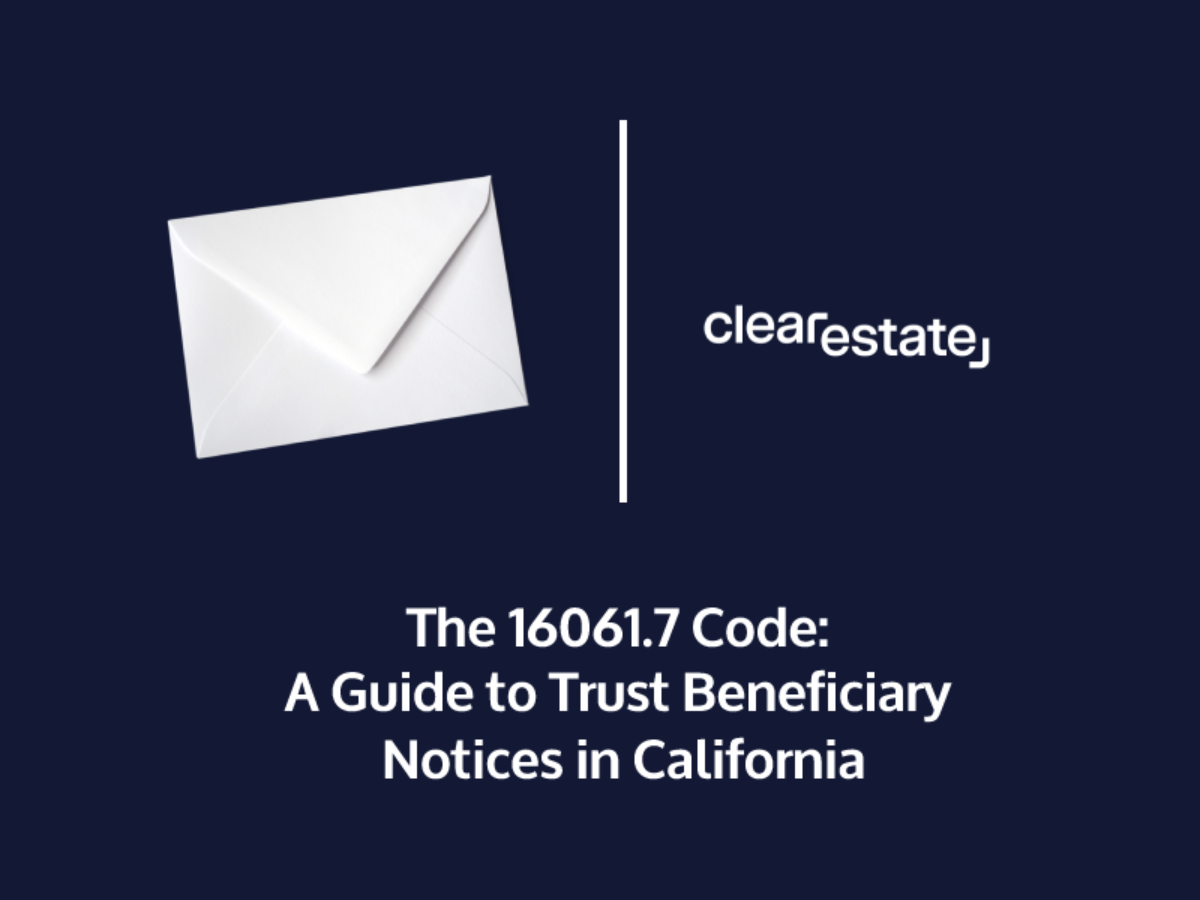
The content on this page has been reviewed by qualified CFP's, TEP's, Tax accountants & Practicing and past lawyers to ensure it is factually accurate, meets current industry standards and helps readers achieve a better understanding of probate, estate planning, and estate taxes for your loved one.

The California Probate Code Section 16061.7 states that a successor trustee has a legal obligation to notify all beneficiaries and heirs in the case of the settlor's death to ensure that all parties involved are well-informed.
Let's take a closer look at potential scenarios when a trustee is required to send a notification and what information this notification should contain. A trustee may face negative financial and legal consequences if this notification doesn't meet the legal requirements. That is why a successor trustee should be perfectly aware of the content and purpose of trust beneficiary notices.
As outlined in Probate Code Section 16061.7 the beneficiary trust notice is a required document is sent by the successor trustee and serves to inform eligible beneficiaries and heirs about the ongoing process of trust administration.
While the most common scenario when this notice is sent out - is the settlor's death and there is only one settlor, there are other cases when a trustee must send it according to the California Probate Code.
The Probate Code Section 16061.7 stipulates specific instances which mandate the issuance of a Trust Notice by a trustee or successor trustee:
In essence, the Probate Code Section 16061.7 mandates a Trust Notice under these circumstances to uphold transparency, maintain accurate communication, and ensure all beneficiaries and heirs are aware of significant changes concerning the trust's administration.
Significance of the Notice
The trust notice serves 2 purposes: it protects beneficiaries and keeps them informed about the commencement of the trust administration process.
In addition, it empowers recipients by informing them of their right to challenge the trust and request further copies of trust documents. By fostering transparency and fairness, this notice plays an instrumental role in the just administration of a trust.
There are 5 key points that should a successor trustee should include in the trust notice:
In addition, when the notice is served in the case of the trustor's death, it should also include the following text:
"You may not bring an action to contest the trust more than 120 days from the date this notification by the trustee is served upon you or 60 days from the date on which a copy of the terms of the trust is delivered to you during that 120-day period, whichever is later."
According to the California Probate Code 16061.7 - The trust notice may be considered incomplete and void if any of these key points are missing.
According to California Probate Code, a successor trustee has 60 days to send the notice following the trustor's death.
More specifically, the California Probate Code states:
(f) The notification by trustee shall be served not later than 60 days following the occurrence of the event requiring service of the notification by trustee, or 60 days after the trustee became aware of the existence of a person entitled to receive notification by trustee, if that person was not known to the trustee on the occurrence of the event requiring service of the notification. If there is a vacancy in the office of the trustee on the date of the occurrence of the event requiring service of the notification by trustee, or if that event causes a vacancy, then the 60-day period for service of the notification by trustee commences on the date the new trustee commences to serve as trustee.
If a trustee fails to send out trust notices within the specified time frame, then legal and financial responsibility can be incurred, as stated by Section 16061.9.
Sample Notification Letter to Trust Beneficiaries in California
You can use the sample provided below to send out Trust Notice in California. Pay attention that this sample letter contains all the key points as required by California Probate Code 16061.7.
Notification of Trust Administration
Dear [Beneficiary Name],
As the Trustee of the Trust established by [Name of Settlor], executed on [Date of Execution], I am writing to notify you about certain aspects of this Trust as it now enters the administration phase.
The Trust administration process is now taking place due to [reason, such as the death or incapacity of the settlor]. The Trustee(s) information is as follows: